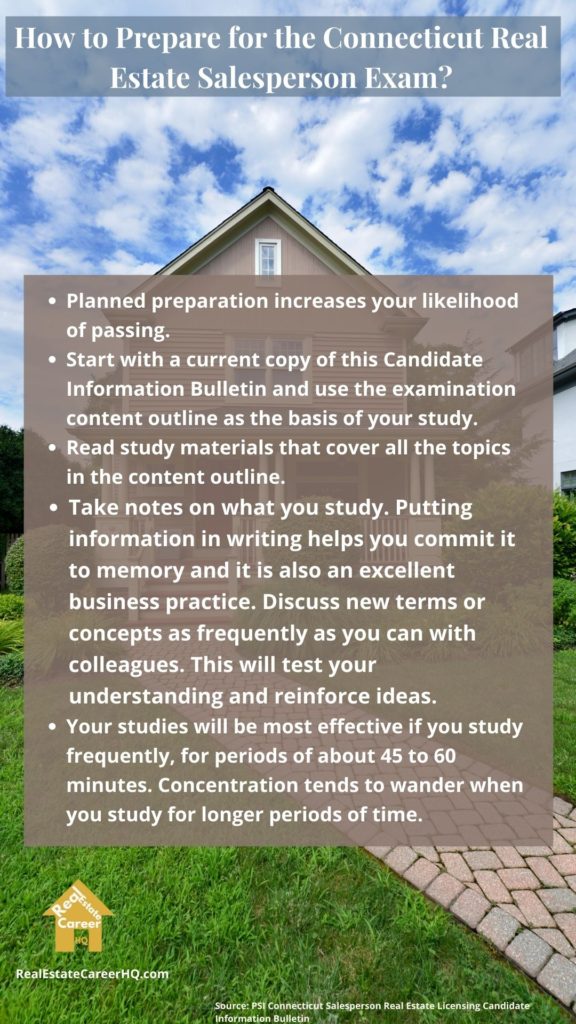(**) Disclosure: This post may contain affiliate links, meaning our company, JCHQ Publishing will get a commission if you decide to make a purchase through the links, but at no additional cost to you.
To become a real estate agent in Connecticut, an applicant must complete 60 hours of pre-licensing courses, pass the salesperson exam, go through a background check, submit an application and license fee to the Connecticut Real Estate Commission.
Before you decide to pursue further in this profession, it’s important to know what the role of a real estate salesperson is. To put it simply, an agent acts as an intermediary between buyer and seller in order to facilitate the sale or purchase of property.
They help clients find homes that meet their needs and negotiate contracts with sellers for those homes. Some agents also help clients in searching for a rental property or lease out their units.
In this guide, you’ll learn about the step-by-step process to become a real estate salesperson in Connecticut, income figures, career updates and FAQ on this profession.
But before we start, I want to give a brief disclaimer. This post is not intended as legal advice or state/federal real estate training. It is for general information only. Please always follow your State laws and best practices.
A Quick Table Summary of Becoming a Real Estate Salesperson in Connecticut
| Eligibility | Education | Exam | Fees |
|---|---|---|---|
At least 18 years of age Citizen of the United States or lawfully admitted alien Have a valid Social Security Number | 90 hours of pre-licensing courses 45 hours of post-licensing courses 21 hours of continuing education each license term | 130 questions 3 hours of writing time Consists of National Portion and State Portion Required passing score is 75%. | Pre-licensing courses fees – $264 to $414 (approximately) Background check fee – $60 Provisional Sales Associate License fee – $95 Application processing fee – $35 Exam fee – $60 |
8 Steps to Become a Real Estate Agent in Connecticut

Step 1: Meet the eligibility requirement
- Citizen of the United States or lawfully admitted alien
- At least 18 years old
- Have a valid Social Security Number
Step 2: Complete the pre-licensing education
You are required to take 60 class hours of Real Estate Principles and Practices. It consists topics such as instruction in real estate law, agency, listing and buyer contracts, finance, fair housing, transfer of title, property description.
I just checked the list of approved education providers. So far, there is only one that offers online classes, which is “Fab Real Estate School.” Their course fee is $475.
Step 3: Submit the registration forms

There are two forms you need to fill out. One is the Real Estate Salesperson Application. In there, it will ask for your personal details, the pre-licensing course completion certificate, and some background questions.
According to the Federal Privacy Act of 1974, the application needs to be notarized and they require the original copy by mail. There is a $80 non-refundable application fee.
You also need to provide a proof of citizenship. (Usually, a copy of valid passport or birth certificate is fine). The license fee is $95 and application processing fee is $35. Here’s the mailing address:
The other application you need to fill out is the Connecticut Real Estate Examination Registration Form. The test is administered by the PSI. There is an exam fee is $65.
Here’s the mailing address: PSI Examination Services, 3210 East Tropicana Ave, Las Vegas, NV 89121
Both forms can be found in the Salesperson Real Estate Licensing Candidate Information Bulletin. Once the PSI approves your application, they will provide you with an Examination Eligibility Postcard and instructions for scheduling the exam.
Keep in mind that you only have one year from the date of eligibility to pass both portions of the exam.
Step 4: Go through a background check
The Connecticut Real Estate Commission is responsible for issuing licenses to real estate salesperson and brokers. To protect the public interest, all real estate salesperson must submit a Criminal Conviction Review Worksheet prior to obtaining a license.
On the worksheet, it asks the applicant to provide details about the crime and conviction – for example, description of the crime, date of conviction, release date.
Step 5: Pass the Connecticut Real Estate Salesperson Exam

The Connecticut real estate salesperson exam has 110 questions with 165 minutes of writing time. It consists of the General Portion and the State Portion. The required passing score is 70%.
Since the exam is a computerized test, your result will appear immediately on the screen. If you pass, you’ll receive a successful notification. Else, you will receive a score report stating your strengths and weaknesses. Then you may schedule to retake the exam.
At the day of the exam, make sure to bring along at least two valid IDs to verify your identity. Else, they won’ let you write it. The primary ID must be government issued and photo-bearing with a signature (i.e.: driver’s license, state ID, passport, military ID.). The second piece must contain a valid signature and your photo.
The exam is to test your knowledge on the real estate topics that are covered in the pre-license education. I’ll also include more details on what will be tested later in this guide.
Step 6: Join a real estate brokerage

In Connecticut, you must activate your license within 2 years after passing the exam. This requires you to be associate with a managing broker. This is the firm who would sponsor your real estate license.
Finding a good trainer is crucial at the initial stage of your real estate career. It’s important to learn a repeatable and systematic process in running your business profitably.
When choosing a real estate brokerage, many people only focus on the commission split, but there are many other factors you also need to consider.
For example, what type of training will they provide? Will they equip you with the skills in finding qualify prospects and closing a sale? Is there a shared office space you could use? Can the brokerage provide you with adequate administrative and marketing support? Will they provide you with leads to work on? Do they utilize up-to-date technology (i.e.: CRM, software subscription) to streamline the daily workflow.
Step 7: Maintain the real estate license
All Connecticut real estate licensees must renew the salesperson license every year before May 31st. You will receive a renewal notice about 30 – 45 days before the expiration date.
You may renew it through the elicense portal. The renewal fee is $285 for odd year and $293 for even ones.
Furthermore, you need to complete 12 hours of real estate continuing education during each license term. The curriculum must include
- CT Real Estate Law for Brokers and Salespersons; (3 hours)
- Understanding and Preventing Racial Bias in Real Estate. (3 hours)
- Real estate elective courses. (6 hours)
Alternatively, you may pass a 40 questions Connecticut CE exam during the CE cycle.
So know your deadlines and don’t wait until the last minute to complete CE and renew your license.
Step 8: Keep up with the Connecticut real estate laws

In order to be successful in the real estate industry, it’s better to keep up with the latest laws and best practices. You may read over the Connecticut General Statutes, Chapter 392 “Real Estate Brokers and Salespersons.”
In there, you can learn essential rules that are applicable to your real estate activities – for example, liability of salespersons, procedure, disclosure of representations, designated buyer agents and seller agents .
Looking to succeed in the real estate industry? Subscribe to our exclusive email list today and gain access to expertly curated real estate guides from industry leaders, as well as discounted CE courses and the latest industry updates. From marketing strategies to virtual staging techniques, our handpicked resources cover everything you need to know to stay ahead of the game. Click here for more details!
Want to know whether being a real estate agent is a good career path? I connected with several real estate professionals, and they shared their thought and experience of this industry with me. You may read their valuable insight here.
Let’s Take a Closer Look at the Connecticut Real Estate Exam!

Here’s the content of the General Portion:
| National Portion Exam Content | Weighting |
|---|---|
| Property ownership | 8% |
| Land use controls and regulations | 5% |
| Valuation and market analysis | 7% |
| Financing | 10% |
| General principles of agency | 13% |
| Property disclosures | 6% |
| Contracts | 17% |
| Leasing and property management | 3% |
| Transfer of title | 8% |
| Practice of real estate | 13% |
| Real estate calculations | 10% |
Here is the exam content of the State Portion:
| Connecticut State-Specific Portion | # of items |
|---|---|
| Connecticut Real Estate Commission and Licensing Requirements | 5 |
| Connecticut Laws Governing the Activities of Licensees | 10 |
| Connecticut Real Estate Agency | 8 |
| Connecticut-Specific Real Estate Principles and Practices | 7 |
Sample Salesperson Questions
A. Which of the following interests in property is held by a person who is granted a lifetime use of a property that will be transferred to a third party upon the death of the lifetime user?
1. A life estate.
2. A remainder estate.
3. An estate for years.
4. A reversionary estate.
B. Which of the following statements BEST identifies the meaning of the term, “rescission of a contract”?1. A ratification of a contract by all parties.
2. A return of all parties to their condition before the contract was executed.
3. A transfer or assignment of a particular responsibility from one of the parties to another.
4. A review of the contract by the legal counsel of either party that may result in a cancellation without penalty or further obligation.
C. Which of the following clauses in a mortgage allows the lender to demand loan repayment if a borrower sells the property?1. Defeasance
2. Prepayment
3. Acceleration
4. Alienation
D. How much cash MUST a buyer furnish in addition to a $2,500 deposit if the lending institution grants a 90% loan on an $80,000 property?1. $5,500.
2. $6,975.
3. $7,450.
4. None of the above.
E. Which of the following single-family residences would get the MOST accurate appraisal by applying the reproduction cost approach to value?1. A rental property.
2. A vacant property.
3. A new property.
4. An historic property.
Answers to Sample Salesperson Questions: A: 1; B: 2; C: 4; D: 1; E: 4
Quote from PSI Connecticut Salesperson Real Estate Licensing Candidate Information Bulletin
Tips to prepare for the Connecticut Real Estate Exam

How many times can I retake the CT real estate exam?
You can take the CT real estate exam as many times as needed within the one year eligibility period. The exam retake fee is $65.
However, rather than retaking the exam, it’s better to be well prepared and pass it on the first try. This way, you may start your real estate business asap. Doing practice questions is an excellent way to prepare for the real estate exam and also boost your confidence.
The Colibri is the online school that I like. Their Exam Prep have helped thousands of students pass their exam on the first try. They even have a “Pass or Don’t Pay” Guarantee. That’s why confident they are with their program. You may click here to view their exam prep. (**)
FAQ about Real Estate License in Connecticut

How much does it cost to get a real estate license in Connecticut?
It costs approximately $620 to get a real estate license in Connecticut. Here’s the breakdown:
- Pre-licensing courses fees – $475 (approximately)
- Application fee – $80
- Exam fee- $65
The above are just the costs of getting the salesperson license. In addition, to start a real estate business, there will be other expenses involved such as MLS subscription, E&O premium, phone, internet, and office supplies, CE courses, and renewal fees.
Also, you may want to invest into exam prep. This can increase your chance in passing the exam on the first try, so that you don’t need to waste time and money in retaking it.
How long does it take to become a real estate agent in Connecticut?
It takes approximately three months to become a real estate agent in Connecticut. But it also depends on the time it takes you to complete the pre-licensing course, exam, application, and get sponsorship by a licensed real estate brokerage.
I have a real estate license in another state. Can I become licensed in Connecticut by applying through reciprocity?
Connecticut has a mutual recognition agreement with numerous states. This means they allow active licensee from another jurisdiction to practice in Connecticut, but subject to special license law requirements.
The states that have reciprocity agreements with Connecticut includes:
- Alabama
- Colorado
- Florida
- Georgia
- Illinois
- Indiana
- Massachusetts
- Mississippi
- Nebraska
- New York
- Ohio
- Oklahoma
- Rhode Island
If you are applying by reciprocity from Florida, Illinois or Indiana, you are required to take the State Portion of the CT Real Estate Salesperson exam. Here’s the Reciprocal Application and there is a fee of $385.
Can a felon be a real estate salesperson in Connecticut?
Although it is possible for an applicant with felony record to obtain a real estate salesperson, the Commission will evaluate it on a case-by-case basis. The CT Real Estate Commission indeed put more emphasis towards the applicant’s honesty, trustworthiness, character and integrity.
(a) The commission or Commissioner of Consumer Protection shall not deny a license under this chapter to any applicant who has been convicted of forgery, embezzlement, obtaining money under false pretenses, extortion, criminal conspiracy to defraud or other like offense or offenses, or to any association or partnership of which such person is a member, or to any corporation of which such person is an officer or in which as a stockholder such person has or exercises a controlling interest either directly or indirectly, except in accordance with the provisions of section 46a-80.
General Statutes, Chapter 392- Sec. 20-316. Grounds for refusal of license
But don’t get discouraged as everyone has a past. The most important is that you can demonstrate that you will serve the public in a fair, honest, and open manner.
Here’s another post that covers how to apply for a real estate license with a felony record. In there, you’ll find practical ideas which could help your application.
How to become a commercial real estate agent in Connecticut?

To become a commercial real estate agent in Connecticut, an applicant must complete 60 hours of pre-licensing courses, pass the salesperson exam, submit an application and license fee to the Connecticut Real Estate Commission.
Basically, it is the same requirement as we just went through because most states do not issue separate licenses for residential and commercial agents.
Furthermore, if you are going to pursue a career as a CRE agent, you should look for a brokerage that could give you the right support and resources.
Here’s the “Complete Guide to a Commercial Real Estate Agent Career“, where I cover the career outlook, earning potential, and valuable feedback from CRE agents. Be sure to check it out.
I have more questions about the Connecticut real estate license, whom should I contact?
You may contact the Connecticut Real Estate Commission at dcp.licenseservices@ct.gov
Real Estate Career Updates in Connecticut

How much do real estate agent make in Connecticut?
Real estate agents in Connecticut earn an average yearly income of $78,540, typically range between $37,820 and $84,050. Top 10% of high-earning real estate sales agents are making over $181,280 per year(*)
At the beginning phase in your real estate career, you probably would not make a lot, because it takes time to build up the client base and established trust with the prospects.
As you continue to gain experience and sharpen your business skills, you should be able to notice a significant improvement to your earning.
Furthermore, your earning potential as a real estate agent would depend on the price range of the properties that you work with, the number of transactions you could complete, the commission splitting schedule with the real estate brokerage and other factors.
(*) Source: Bureau of Labor Statistics (May 2020)
[Read: Real Estate Agent Salary Guide – What Makes a 6 Figures Earner?]
Is being real estate agent a good career in Connecticut?
Real estate can be a good career in Connecticut if you enjoy running a self-employed business, interacting with different people and have flexible work hours.
According to the RedFin, as of May 2021, there were 6,003 homes sold, and the median sales prices was $337,000. All these figures went up when comparing to the year-over-year period. As I’m reviewing the data now, it seems that the demand far exceeded the housing supply. In fact, 61.9% of homes were sold above the list price.
These transaction volume shows a significant demand for real estate agents. According to Bureau of Labor Statistics (May 2020), there were 1,250 real estate sales agents in Connecticut, which worked out to be 0.814 sales agent per 1,000 jobs.
However, there are always people succeeding and failing in each industry. The utmost importance is how you can remain competitive in the real estate market.
Check out this article: 30 Practical Tips to Become a Successful Real Estate Agent!
So that’s all I have to share for now. Do you like this guide? If so, please share it.
(**) Affiliate Disclosure: Please note that some of the links above are affiliate links, and at no additional cost to you. Our company, JCHQ Publishing will earn a commission if you decide to make a purchase after clicking on the link. Please understand that we include them based on our experience or the research on these companies or products, and we recommend them because they are helpful and useful, not because of the small commissions we make if you decide to buy something through the links. Please do not spend any money on these products unless you feel you need them or that they will help you achieve your goals.
Disclaimer: The information in this post is for general information only, and not intend to provide any advice. They are subjected to change without any notice, and not guaranteed to be error-free. Some of the posts on this site may contain views and opinions from individual not related to JCHQ Publishing. They do not necessarily reflect our view or position.
Reference:
- Connecticut Real Estate Commission (source)
- fab real estate school (source)
- PSI Connecticut Salesperson Real Estate Licensing Candidate Information Bulletin (source)
- Bureau of Labor Statistics – Real Estate Agents (Source)
- RedFin – Connecticut Housing Market (source)
- Real Trends: 2018 Real Trends 500 by Volume (Source)


